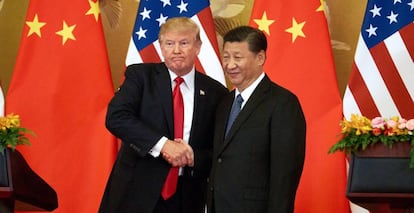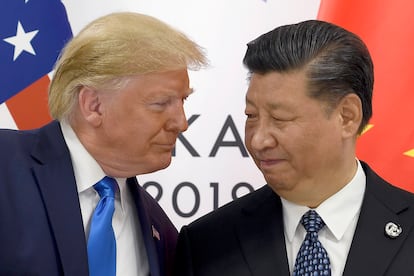China prepares for an unpredictable era under Trump
Beijing faces the prospect of an intensified trade conflict if the Republican proceeds with his plan to impose a 60% increase in tariffs on Chinese goods


In Zhongnanhai, the seat of China’s central government, located next to Beijing’s Forbidden City, a team has likely being reviewing economic contingency plans prepared for the event of Donald Trump’s victory. If the president-elect follows through on his promises — and he has vowed to do so in his first speech — the United States will impose 60% tariffs on Chinese goods, potentially triggering a new phase of the trade war that Trump himself started in 2018.
This scenario is familiar territory. For better or worse, China knows what it is like to deal with the Republican in the White House. On one hand, it brings a significant level of unpredictability and relentless economic conflict. On the other, Trump’s isolationist stance could present opportunities for China to advance its strategic interests on the global stage: from increasing its influence and moral authority among Global South nations to courting Washington’s traditional allies, whose ties with the U.S. may fray, as could be the case with the European Union.
“Trump is fundamentally unpredictable, and it is unclear how he will address the core issues of the U.S.-China relationship,” analysts at the Trivium China consultancy wrote in a bulletin published on Wednesday. “That means the party-state will now focus on trying to figure out what Trump will do in his second term.”
Beijing did not openly express a preference for either presidential candidate. The feeling in China before the U.S. election could best be described as anxious, as both outcomes represented different versions of the same fundamental challenge. The view of China as a strategic threat is one of the few things that Republicans and Democrats can agree on. Consequently, the bilateral relationship is expected to remain volatile in the coming years, with conflicts extending beyond trade to encompass technological and military competition.

Trump will inherit a U.S.-China relationship that hit its lowest point in decades just a year ago. Relations are now stabilizing, but remain far from normal. The ecological transition — an industry where China is a global leader — may emerge as a significant battleground.
Chinese analysts aligned with the Communist Party leadership predict that U.S. pressure and confrontations will persist. On Thursday, Chinese President Xi Jinping congratulated Trump on his victory and took the opportunity to highlight the fraught history between the two nations. “History has shown that China and the United States benefit from cooperation and suffer from confrontation,” Xi said, according to the state-run Xinhua news agency.
“A stable, healthy and sustainable China-US relationship is in the common interest of both countries and is in line with the expectations of the international community,” added Xi, who said he hoped the relationship would be based on “mutual respect” and “peaceful coexistence.” The Chinese leader also called for greater dialogue to manage differences, and stressed the importance of finding “a right way” for the two powers to “get along with each other in the new era.”
When asked about potential tariffs, Mao Ning, the spokesperson for the Chinese Foreign Ministry, responded tersely on Wednesday: “We do not answer hypothetical questions.”
An inscrutable personal relationship
Trump’s personal relationship with President Xi Jinping is difficult to determine. Trump spoke of a quasi-friendship with the Chinese leader — at least until the onset of the pandemic. Xi, who has now been in power for 12 years, dealt with Trump during his previous term. Addressing the sensitive issue of a potential invasion of Taiwan, Trump asserted that the U.S. would not need to resort to force, citing President Xi’s understanding of him: “He respects me and he knows I’m [expletive] crazy,” Trump claimed during a meeting with The Wall Street Journal editorial team. “I had a very strong relationship with him,” he added. “He was actually a really good, I don’t want to say friend — I don’t want to act foolish, ‘he was my friend’ — but I got along with him great.” Trump described Xi as “a very fierce person.”
The Chinese president likely remembers the first time they met at Trump’s Mar-a-Lago estate in 2017. During a dinner, Trump disclosed that he had just authorized a military strike on targets in Syria. Recalling the moment, Trump said: “I said: ‘Mr President, let me explain something to you […] we’ve just launched 59 missiles.’” They were enjoying, as Trump put it, “the most beautiful piece of chocolate cake that you have ever seen.”
Sign up for our weekly newsletter to get more English-language news coverage from EL PAÍS USA Edition
Tu suscripción se está usando en otro dispositivo
¿Quieres añadir otro usuario a tu suscripción?
Si continúas leyendo en este dispositivo, no se podrá leer en el otro.
FlechaTu suscripción se está usando en otro dispositivo y solo puedes acceder a EL PAÍS desde un dispositivo a la vez.
Si quieres compartir tu cuenta, cambia tu suscripción a la modalidad Premium, así podrás añadir otro usuario. Cada uno accederá con su propia cuenta de email, lo que os permitirá personalizar vuestra experiencia en EL PAÍS.
¿Tienes una suscripción de empresa? Accede aquí para contratar más cuentas.
En el caso de no saber quién está usando tu cuenta, te recomendamos cambiar tu contraseña aquí.
Si decides continuar compartiendo tu cuenta, este mensaje se mostrará en tu dispositivo y en el de la otra persona que está usando tu cuenta de forma indefinida, afectando a tu experiencia de lectura. Puedes consultar aquí los términos y condiciones de la suscripción digital.








































